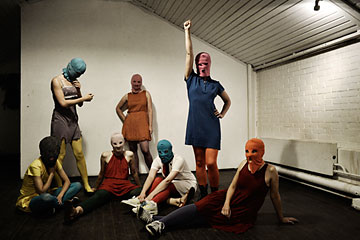
Members of the dissident punk collective Pussy Riot plan their next performance at a Moscow hideout. Three members were arrested earlier this year.
(3 of 3)
The creeping return of Stalinist-era surveillance is part of the legacy of Putin's long-serving security chief, Nikolai Patrushev, whose influence has been on the rise since Putin's return. During his almost nine years as FSB chief, the legal notion of "extremism" was significantly expanded, lumping together terrorists, liberal activists, trade-union leaders and writers critical of the Kremlin. According to a recently published history of the FSB, The New Nobility, which Soldatov co-authored, the outspoken people from all of these groups are entered into a database of citizens who can be monitored by the state. "It basically includes anyone who actively opposes the regime," Soldatov says. In 2008, when Putin moved over to the role of Prime Minister because of constitutional term limits, Patrushev took over the Security Council, a body that oversees all of Russia's law-enforcement and spy agencies. His tenure there has coincided with a huge jump in government surveillance. Even as the official crime rate fell from 2007 to '11, the number of wiretaps and other methods of surveillance jumped by 75% to reach a record last year of more than 465,000, according to data released by the Supreme Court.
Alexei Filatov, a retired lieutenant colonel of the FSB, insists that the spike comes down to modern gadgetry, not over-zealous policing. "We have a lot more technical capabilities now," he tells me. "It's not that we didn't have the need [to conduct surveillance] before, but we didn't have the means to do it all." The system used to conduct surveillance in Russia is known as SORM, which intercepts phone conversations and Internet traffic, and there are now seven government agencies that can legally use it — even the bureau of prisons. Although each wiretap officially requires a court order, Filatov admits that "quite often, this technology is used not with the aim of fighting terrorism or crime." The FSB did not respond to repeated requests for comment.
Just take the case of Vladimir Ryzhkov. A career politician and former lawmaker, Ryzhkov helped lead the anti-Putin protests last winter and immediately became the target of leaked surveillance videos. The first one caught him in a Moscow café discussing strategies for a protest with another lawmaker, Gennady Gudkov. "We made plans for that meeting over the phone only a half an hour before," Gudkov tells me. "So not only did they have our phones tapped, but they had a mobile team ready to set up surveillance in the café." Things only got nastier from there. In February, a video was posted online from a camera apparently installed inside Ryzhkov's home or office. It showed someone with a stark resemblance to Ryzhkov masturbating and receiving fellatio from a young woman on a couch. Ryzhkov claims the sex acts were spliced in using "fake, doctored video," although he believes some of the footage may have been taken by a hidden camera. "I'm watched all the time," he says. "What do you expect? The country is run by an officer of the KGB, so the KGB is what we're dealing with."
And then there was Alexander Lebedev. When the winter protests broke out, he became the only Russian billionaire to side with the opposition, even financing Navalny's anti-corruption projects. He wound up paying dearly for it. In July, a video montage appeared on the Internet of Lebedev with a handful of prostitutes, usually two at a time, at a suite in Kiev's Hotel Ukraina. Even though Lebedev himself owns the hotel, it appears that two hidden cameras were installed in the suite, one in the living area and another facing the bed. What they captured would amount to pornography were it not for the editor's decision to blur out Lebedev's genitals. Lebedev, who is married, admits that the tapes are genuine. "Here it is just not surprising," Lebedev told me in September. "People accept that these are the rules, that opponents are fair game, even when it comes to their private lives, their private property." Since the tapes leaked, Lebedev has decided to sell all his Russian assets and move his money abroad. "I'm done banging my head against the wall here."
Navalny has meanwhile come to accept near constant surveillance as an occupational hazard for the opposition. The frame of his office doorway is still partly disassembled, revealing the small hole where he discovered the hidden camera in August. "Of course it makes you paranoid," he tells me, glancing toward the camera wires that protrude from the doorjamb. Since Putin's return to the presidency, Navalny's apartment, where he lives with his wife and two children, has been searched twice; a sweep of his parents' wicker factory followed. By the arrival of fall, Navalny had given up sweeping his office for bugs. He doesn't see the point. "I just work on the assumption that their technology is so much stronger than ours that there's no way to fight them. If they want, they'll listen through the windows, through the power outlets, through the walls. We just have to learn to live with that."
